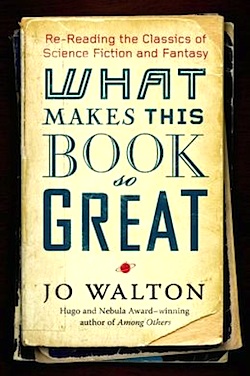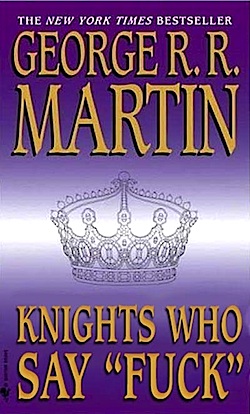Jo Walton’s new book What Makes This Book So Great (U.S. / U.K.), is a collection of some of her best Tor.com posts honoring, analyzing, and reassessing science fiction and fantasy. The full collection, featuring over 130 essays, is out on January 21st and includes great opinion pieces like this, originally published in December of 2008.
A little while ago the Mighty God King posted a marvellous collection of doctored book covers, with the titles he felt the books he’d loved as a teenager should have had. The genius of this was the way he used the exact right fonts every time, so that Mercedes Lackey’s My Little Pony Goes to War had just the font you were expecting to see on that cover. One of them that made me laugh out loud was his cover for George R. R. Martin’s A Game of Thrones. (I love those books.) His new title was Knights Who Say “Fuck,” which amused me not only because of the clever Python reference but also because it’s true, they do, and that’s one of the things that makes it different from traditional high fantasy. He’s not the only person whose knights are saying “fuck” these days—Sarah Monette’s charmingly foul-mouthed Mildmay leaps to mind—but it is something you never used to see. It didn’t fit the register of fantasy. The register has broadened. Interesting.
I’m reading Cherryh’s Downbelow Station, which was published in 1981. I started it immediately after finishing Hellburner, which is set earlier but was published in 1992. I noticed immediately that in Downbelow Station the troopers “breathe an obscenity into com,” “swore quietly,” “swore at length,” “adding an obscenity.” In Hellburner in equivalent situations they’re saying “Shit, shit, shit!” and “Fuck!”
Now I read both of these books pretty much when they came out, and I didn’t notice anything odd about the level of permitted swearing in them. Yet something definitely changed between 1981 and 1992, and it wasn’t C. J. Cherryh. The number of times someone breathes an oath, an obscenity, or swears viciously in Downbelow Station, you can tell she knows the words the troopers are saying. In fact it reminds me of the coy dashes you get in Trollope, where the fact that a husband called a wife a “——” in He Knew He Was Right is plot-rocking, and no, you never find out what the word is. (The footnotes think “harlot.” As I’m not even faintly shocked by “harlot” I’ve decided to fill in that blank, and all Trollope’s blanks, with the worst words I know.)
 So, was Cherryh being effectively censored by what you were allowed to say?
So, was Cherryh being effectively censored by what you were allowed to say?
The thing that surprises me about that is the date. I thought it was the sixties when people in books were allowed to use actual oaths, rather than just mighty ones. Did genre fiction lag behind? Certainly it was the New Wave that started talking about sex, but how careful were the words? I noticed when reading W. E. B. Griffin that you can say “shit” all you like in his books as long as you’re not talking about “human excrement” and similarly “fuck” is fine unless you’re talking about “sexual intercourse.” Obscenities are different from description, and use of the words can vary in either direction. These words are charged, and they have very specific registers, they’re significant markers.
You used to see fake “futuristic” swearing. (Who can forget Larry Niven’s “tanj”?) When did that stop? Drinking Sapphire Wine has it, and that’s 1976.
So, things clearly changed in the eighties. Why? Was there a specific change, a specific book or date that it changed, within genre fiction? Or was it a general cultural change of what was acceptable slowly bleeding through into genre? Did it get to SF first and seep into fantasy later? A Game of Thrones is 1996.
And when did it stop being daring for people to swear “like a trooper” and become normal? My memory is that in South Wales when I was a child adults swore in Welsh, and what they said, translated, meant “God” or “the Devil,” and “bloody” was pretty strong swearing in English. But my memory of being a young adult in Britain in the early and mid-eighties didn’t include other young women casually saying “fuck” the way they do now. I think there has been an actual change, and it isn’t just that literature was coy about recording what people said, as that what people say has changed. I’m sure this is also a difference between Britain and North America, and maybe between different areas too.
And in the future? Well, there are fashions in these things. Perhaps our texts with their liberal scatterings of “fuck” will eventually look as quaint as Trollope’s dashes.
Jo Walton won the John W. Campbell Award for Best New Writer in 2002, and the World Fantasy Award for her novel Tooth and Claw in 2004. Her several other novels include the acclaimed “Small Change” alternate-history trilogy, comprising Farthing, Ha’penny, and Half a Crown. Her novel Among Others won the Hugo and Nebula Awards in 2012.










